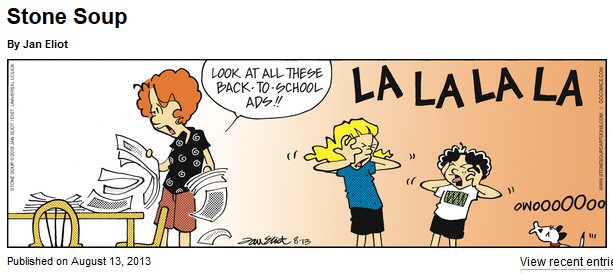Back to School Craft Ideas
Hard to believe, but it is back to school time yet again. And kids throughout the country are doing their usual complaining. But school doesn’t have to be all that bad. It’s definitely easier to see friends when everyone is in school. The summer time boredom blues disappear with the start of school activities. And every girl loves to do the annual back to school clothes shopping trip. Plus there always seem to be fun new products for school supplies.
Just to make back to school time not so hard, I’ve done a little searching on Pinterest and come up with a few do-it-yourself school projects that will fit any budget.
This is a clever idea I want to do on every notebook I own. Use chalkboard paint to turn the front cover of a notebook into a place to write reminders on the go. Or draw a new picture every day to suit a mood. Your kids will come up with many original ideas on what to paint and how to use their chalkboard notebooks.
These clothespins help solve the problem of how to display children’s artwork without using scotch tape which always seems to tear the paper. Each child in the family can make their own personalized set of magnetic clothespins so hanging their artwork will be even more special. What a great way to decorate the refrigerator!
What a fun and permanent way for kids to collect first day of school greetings. A t-shirt that looks like a notebook. Do one every year to remember new friends made on the first day of school.
I’m going to guess every tween girl is going to want one of these pocket books to store her stickers. A clever idea to keep pens and pencils handy too and a great way to use jeans that your kid has outgrown.
I’m sure there are plenty more creative ideas to make the first day of school fun. Please share in the comments your ideas for us all to enjoy.


 Reblogged from
Reblogged from  As most women know, the first question asked at each gynecology visit is ‘What was the first day of your last period?’ Doctors ask this question to determine how regular a woman’s menstrual cycle is and if the woman is pregnant, the date helps determine the approximate day of conception. Learning how to track your period is therefore a handy skill to have.
As most women know, the first question asked at each gynecology visit is ‘What was the first day of your last period?’ Doctors ask this question to determine how regular a woman’s menstrual cycle is and if the woman is pregnant, the date helps determine the approximate day of conception. Learning how to track your period is therefore a handy skill to have.
 In this day and age in the United States we seem to have a product to fit every choice. Whether it be food, shoes, homes, or even yes, feminine hygiene pads, there is something unique that fits your life style. It can be confusing to sort through all the options but once you find the perfect fit you will probably be a customer for life.
In this day and age in the United States we seem to have a product to fit every choice. Whether it be food, shoes, homes, or even yes, feminine hygiene pads, there is something unique that fits your life style. It can be confusing to sort through all the options but once you find the perfect fit you will probably be a customer for life. Throughout our journey in bringing menstruation education to young girls we have found that girls (and their parents) can sometimes be very shy about using the correct words for their female reproductive parts. Even saying the words ‘menstrual period’ can be embarrassing to the girls who would much rather say ‘Aunt Flo’ or ‘being on the rag’.
Throughout our journey in bringing menstruation education to young girls we have found that girls (and their parents) can sometimes be very shy about using the correct words for their female reproductive parts. Even saying the words ‘menstrual period’ can be embarrassing to the girls who would much rather say ‘Aunt Flo’ or ‘being on the rag’. I only attended one overnight camp when I was a teenager and it wasn’t the best of experiences. We seemed to spend more time cleaning the facilities than having fun, not my idea of how to spend camp time. When our kids were growing up we looked for camps that would teach them new skills (outdoor cooking at Boy Scout camp, how to dunk at basketball camp) plus how to manage themselves away from home.
I only attended one overnight camp when I was a teenager and it wasn’t the best of experiences. We seemed to spend more time cleaning the facilities than having fun, not my idea of how to spend camp time. When our kids were growing up we looked for camps that would teach them new skills (outdoor cooking at Boy Scout camp, how to dunk at basketball camp) plus how to manage themselves away from home. Our younger son Dylan was involved in Boy Scouts for many years. One of the traditions his troop did every year was to place flags at the gravestones of fallen soldiers at a cemetery near our home. The troop carried out this task every year for Memorial Day and Veterans Day. I always tried to go with Dylan and his troop because I feel it is important to honor those who have served our country in the military.
Our younger son Dylan was involved in Boy Scouts for many years. One of the traditions his troop did every year was to place flags at the gravestones of fallen soldiers at a cemetery near our home. The troop carried out this task every year for Memorial Day and Veterans Day. I always tried to go with Dylan and his troop because I feel it is important to honor those who have served our country in the military. When our children were born, the internet did not exist (our youngest is 21 years old). When we needed advice on parenting we turned to our parents and my sister-in-law whose first born son is the oldest cousin. We also relied heavily on books by
When our children were born, the internet did not exist (our youngest is 21 years old). When we needed advice on parenting we turned to our parents and my sister-in-law whose first born son is the oldest cousin. We also relied heavily on books by  This past weekend, my husband and I attended the wedding of one of our daughter’s high school friends. Hayley was a bridesmaid and it was fun to see her walk down the aisle, even though she wasn’t the blushing bride. It made us realize though that her wedding will some day be upon us (we hope!) and there are some lessons we would like to make sure she knows before she embarks on the marriage road. Note that we want our two sons to learn these lessons too!
This past weekend, my husband and I attended the wedding of one of our daughter’s high school friends. Hayley was a bridesmaid and it was fun to see her walk down the aisle, even though she wasn’t the blushing bride. It made us realize though that her wedding will some day be upon us (we hope!) and there are some lessons we would like to make sure she knows before she embarks on the marriage road. Note that we want our two sons to learn these lessons too!